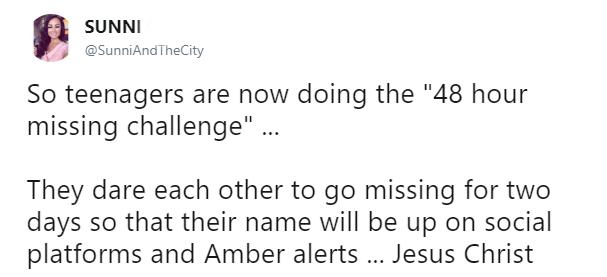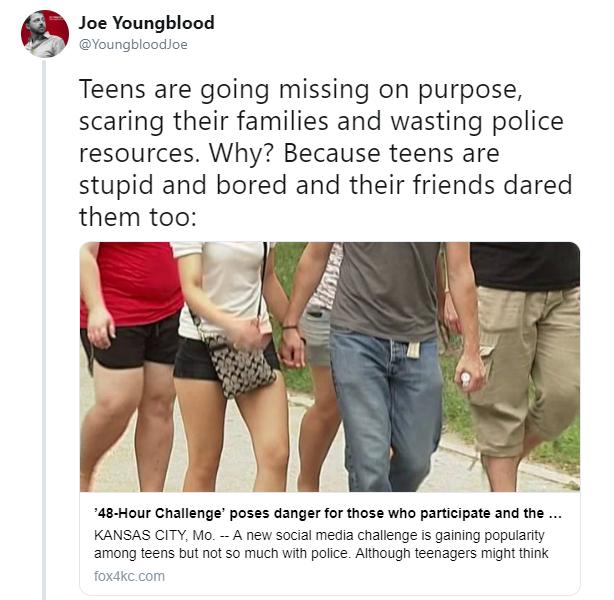Police Are Warning Parents About the "48 Hour" Challenge That Encourages Kids to Go Missing
Updated Feb. 14 2019, 10:59 a.m. ET

If there's a surefire way to get the "older generation" up in a tizzy, it's to list the number of ridiculous internet "challenges" that have come out in recent years. Whether it's vaping tide pods, blindfolding yourself while driving, or seeing if a roll of coins fits in your clavicle, the sheer number of dumb and downright dangerous challenges that have surfaced online is staggering.
Most of them are usually staged (especially when it comes to eating tide pods), but there are a few people who seriously put themselves at risk because they don't understand the "joke" part of the challenge, which is how most of these "challenges" begin: as a gag. Kids are just doing it for the memes and laughs, but there are always a few participants who actually go through with it.
Then there are challenges with more inimical purposes.
Like the "Blue Whale" challenge in 2017 which originally had links to a Russian social media site that encouraged kids to kill themselves or others. There was also the "Momo Challenge" which was a clever ploy to get unsuspecting mobile phone users to give up their personal data which was then used for identity theft and general scam-foolery.
The latest of these "had-to-be-developed-by-criminals" challenges is the "48-hour challenge" which is beginning to trend online.

The goal of the challenge is simple: try to go missing for at least two days (a full 48 hours) so that your name starts popping up on the emergency notices on people's cell phones in your area. After you've accomplished your mission, you're free to go home.
Haven't these kids ever heard of the "boy who cried wolf" story, or did they start taking that out of the core curriculum in public schools, now?
You get "bonus points" for the bigger stink that's caused on social media for your disappearance. While "games" of self-harm like the hot coil challenge usually affect one individual physically, and their immediate circle of friends who have to now deal with the fact that someone they care for is so, so stupid, there are numerous problems with the 48-hour challenge that have not only parents, but law enforcement on edge.

The most obvious is the strain on local resources that takes place whenever a young child goes missing. If there are several going "missing" at one time, then that means there are more officers prowling the streets for a child who isn't really missing, which will take away from the time they could be spending investigating another crime, or, maybe even a teenager who's actually gone missing.
Then there's the car alarm analogy. Whenever car alarms were first introduced, I'm sure whenever one of them went off people started running outside or looking out into their driveway to see if someone was breaking into their vehicle of trying to make off with it.
Now, whenever an Amber alert pops up on your phone, you probably pay way more attention to it than the beeping of a car at night, because it's so infrequent. What happens if your smartphone starts blowing up with Amber alert messages every other day? Are you going to care after a while? No, you're going to be annoyed and probably deep down inside hope the kid is never found for constantly vibrating.

Although there are a fair share of adults who participate in these dumb social media challenges, it's not hard to see that they're targeted directly at teenagers, and teens are the ones who engage in them the most.
While it's easy to just chalk it up to "well young people are dumb, what do you expect?" child psychologists have a more in-depth explanation as to why teens are so susceptible to these dares.
It all has to do with brain development and the growth of "grey matter" in our noggins. Our brains create a bunch of connections and, through trial and error and learning, "synaptic pruning" cuts off the neural connectors to parts of our brain that our environments have trained us into believing aren't necessary.
All young animals, including humans, in order to create the necessary synapses so we can comprehend and thrive in our environments, must test their surroundings for this to occur.

The need to test these synapses increases during puberty, which is why teenagers are almost compelled in a way to try new and dangerous things. As per Newsweek:
"The teen brain is compelled to seek out new experiences that help the brain learn, but teens don’t yet have the tools to make rational choices. That’s why accidents, drug use, unprotected sex and other risky behaviors are much more common in young people, some experts say. According the National Institutes of Health, accidental deaths increase dramatically during early and late adolescence. Death by injury occurs at rates six times higher among teens 15 to 19, compared with those 10 to 14."

It doesn't look like dangerous social media challenges and dares are going anywhere anytime soon, as kids are biologically programmed to test themselves in new and often dangerous ways, so what's a concerned parent to do?
Child psychologists suggest talking to your kids specifically about social media challenges and a lot of the risks associated with them. Teens might not always listen to you, but maybe a good way is to convince them that you think it's cool. Whenever parents like something, teens automatically assume it's lame. So there's always that option.